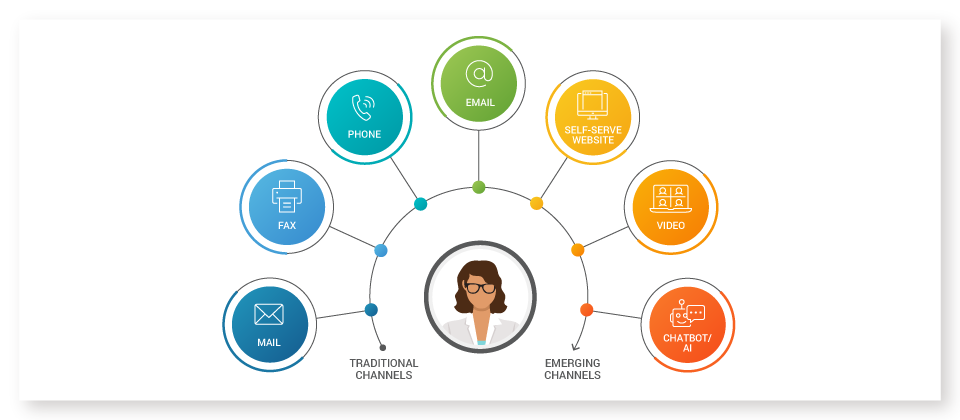Blog
Providing Trusted Medical Information Via New, Emerging Channels
Mar 03, 2022 | Callum Hawes
Mar 03, 2022 | Callum Hawes
As the number of HCP and patient inquiries continues to grow and their communication preferences evolve toward new digital channels, medical information teams are increasingly challenged to respond to requests in a timely and accurate way. To increase efficiency many are looking at providing information through new means and formats that they might not have traditionally supported.
A recent article published by MILE (Medical Information Leaders in Europe) emphasizes the move by HCPs to more online access. The authors note that because of their wide range of information needs, HCPs are now referring to a larger variety of sources for medical information—even unauthoritative ones, leading to calls to build a governance model around this type of data.
The emergence and adoption of new technologies and channels was a key topic at a recent meeting of the Veeva Medical Information Community Forum. Here are some key takeaways shared by the group based on their experiences with these new initiatives:
Balancing traditional vs. emerging channels
While there are still HCPs and patients or demographics that prefer the more traditional communication channels (such as phone, email, mail, and fax), the concept of “anytime, anywhere” access is having a large impact on the channels that medical information teams make available and provide responses through.
To that end, we are also seeing newer channels, such as self-serve websites, videos, and chatbots/conversational AI, becoming increasingly prevalent to meet the needs of digitally savvy customers. One channel should not necessarily overtake the others, nor should more mature channels be the only choice. Those who leverage medical information services see more value in organizations that offer a mix of channels, therefore providing them with a greater choice of how to interact.
Many medical information teams are at different stages of their journey toward channel maturity. More traditional channels are embedded in current operating models while new ones are starting to be more widely adopted. One head of medical information, for example, indicated they have been researching the use of new technologies. She notes, “Pharma needs to provide a way for HCPs to access accurate medical information they can rely on and trust, rather than Googling and getting the first thing that pops up, and trying to decide whether it is accurate or not.”

A closer look at emerging channels
In determining the suitability of emerging channels, medical information teams must evaluate certain dependencies, such as the size of the organization, the number of requests they receive, the therapeutic area, and the maturity of the products they are working with.
Self-service websites
One popular and emerging form of intake is self-service websites. This technology allows HCPs to search and find answers to questions they might have or submit an inquiry directly on the pharma company web page. In general, the forum participants believed these forms of online information sources are more common in the United States than in Europe, where there are more certifications.
MILE also quotes a recent survey of 700 EU physicians and reported that only 32% considered that company websites influenced clinical decisions, compared to 62% for search engines and 70% for professional society websites. While self-service websites were seen as a real opportunity for building trust with HCPs, forum participants agreed it was challenging to drive traffic to their company websites and to keep them up to date.
Aggregated sites
With ever-tightening budgets and the difficulty in driving traffic to company-specific websites, some pharma organizations are investigating aggregated medical information portals. Industry consortia, such as phactMI, collect medical information from leading pharmaceutical companies in one place, and HCPs can search for product information or find appropriate contact details. The goal is to provide an improved response time to stakeholders and increased efficiencies to medical information teams. There was an overall positive response to this idea from the forum participants, with one director-level member commenting, “I think if that became a source of information from all pharma companies, it could potentially work because people will trust it as a reputable site.”
Chatbots
Many pharma companies are investigating chatbots/conversational AI to support efficient responses to medical information requests. Chatbots use artificial intelligence to simulate a conversation between an HCP or patient and the medical information center, analyzing each request to extract information and provide an appropriate automated response.
Chatbots might be most effective when there is a high volume of similar inquiries. It may be more difficult to implement this technology with a portfolio of specialized products that often require complex and nuanced responses. Community forum participants also expressed some concern about the lack of regulations around what kind of information can be distributed via chat.
Building credibility across all channels
As medical information organizations implement additional channels, they will need to consider applying different formats of content. As phactMI points out in its recent survey, scientific response content is trending towards utilization of mixed media, such as infographics and graphs, charts, tables, animated files, and videos.
No matter the channels of medical information or the content format, credibility remains an important factor. It is very easy to degrade trust by not having information available when HCPs or patients want it, or if the information is inaccurate or out-of-date. The number one thing stakeholders are looking for is consistency of medical information across all channels—be it email, phone, website, or chat.
To learn more about streamlining medical information delivery, watch the on-demand session from Veeva’s 2021 EU Summit Connect.
